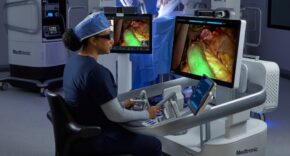
It is no secret that healthcare systems worldwide are overburdened. From increasing patient complexity (and volume) to persistent staffing shortages and rising operational costs, healthcare is stretched thin. As healthcare providers seek solutions to these pressing issues, artificial intelligence (AI) has emerged as a powerful tool with the potential to transform patient care delivery and support healthcare professionals in their critical work.
Advancements in technology have transformed many aspects of the healthcare sector—from educational institutions offering online nurse practitioner programs to the rise of telehealth post-COVID-19 pandemic and now the implementation of artificial intelligence. This integration of AI into nursing practice represents a significant opportunity to enhance patient care quality, streamline clinical workflows, and support nurses in making informed decisions while maintaining the essential human element of healthcare delivery.
The Current Landscape of Nursing and Technology
Nursing is a key part of healthcare and has always adapted to technology. The post-COVID-19 era, for example, saw a dramatic shift towards telehealth and remote patient monitoring.
Similarly, advancements in technology have transformed many aspects of the healthcare sector — from educational institutions offering online nurse practitioner programs to the rise of wearable health tech and remote consultations. These innovations underscore the healthcare sector’s reliance on digital tools, with AI now poised to redefine nursing practices.
AI’s Role in Enhancing Patient Care

AI’s integration into nursing can revolutionize patient care in several ways.
1. Early Detection and Diagnostics
AI-powered tools, such as predictive analytics and machine learning algorithms, can identify patterns in patient data that human eyes might miss. For example, these systems can:
- Predict sepsis in patients hours before symptoms become critical.
- Analyze imaging data to assist with early cancer detection.
- Alert nurses to deteriorating patient conditions through real-time monitoring systems.
These capabilities enable nurses to act swiftly, significantly improving patient outcomes. Early detection can be extremely helpful when it comes to effective healthcare and predictive algorithms can make a real difference in that.
2. Streamlining Administrative Tasks
One of the major challenges in nursing is the administrative workload. AI can automate tasks such as scheduling, patient record management, and documentation, allowing nurses to focus more on patient care. For instance:
- Virtual assistants can transcribe notes and update electronic health records (EHRs).
- AI algorithms can optimize staff scheduling, ensuring adequate coverage, and reducing burnout.
3. Personalized Patient Care
AI can tailor care plans based on individual patient needs. Using data from wearables and health apps, AI systems can:
- Provide real-time feedback on patient vitals.
- Recommend lifestyle modifications to manage chronic conditions.
- Alert nurses to deviations from expected recovery patterns.
This personalization ensures that care plans are both effective and patient-centric. Monitoring recovery periods to understand any variations can also help detect post-surgery complications and infections early. This can be a game-changer in terms of proactive healthcare.
Educational Implications for Nurses

As AI becomes integral to nursing, educational institutions must evolve to equip future nurses with the necessary skills. Many online nurse practitioner programs as well as in-person nursing programs are increasingly incorporating AI modules into their curricula, preparing students to interpret data from AI tools, collaborate effectively with AI systems in clinical settings, and uphold ethical standards in AI-driven decision-making.
Overcoming Challenges in AI Integration
While AI offers immense potential, its integration is not without challenges.
1. Ethical and Privacy Concerns
Patient data security remains a top priority. Higher levels of technological integration will inevitably pose new challenges with respect to cyber security. Healthcare providers must:
- Ensure compliance with regulations like HIPAA.
- Employ robust encryption methods to protect sensitive information.
2. Resistance to Change
Adapting to AI tools requires a cultural shift within healthcare teams. Strategies to overcome resistance include:
- Providing comprehensive training programs.
- Demonstrating the tangible benefits of AI in practice.
3. Cost and Accessibility
The high cost of AI implementation can be a barrier, particularly for smaller healthcare facilities. However, partnerships with technology providers and government incentives can help bridge this gap.
The Future of Nursing with AI
Looking ahead, AI’s role in nursing will continue to expand. Innovations on the horizon include:
- AI-Driven Robotics assisting with physical tasks such as lifting patients or delivering medications.
- Virtual Nursing Assistants providing 24/7 support to patients via chatbots.
- Advanced Predictive Models enabling precision medicine by analyzing genetic data.
These advancements promise to make nursing more efficient and impactful while maintaining the human touch that is central to patient care.
——
Artificial intelligence is not a replacement for nurses but a powerful ally in improving patient care. By embracing AI, nurses can improve their practice, reduce burnout, and deliver more personalized and efficient care.
As tertiary education focusing on technology prepares the next generation of nurses, the potential of AI to transform healthcare becomes even more tangible. The time to integrate AI into nursing practice is now — a step towards a future where technology and humanity work hand-in-hand to achieve the best patient outcomes.











